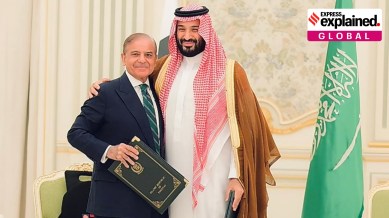While not many details about the pact are out yet, a key clause has made headlines around the world: “any aggression against either country shall be considered an aggression against both”.
“This agreement, which reflects the shared commitment of both nations to enhance their security and to achieving security and peace in the region and the world, aims to develop aspects of defence cooperation between the two countries and strengthen joint deterrence against any aggression. The agreement states that any aggression against either country shall be considered an aggression against both,” a statement from the Pakistani prime minister’s office said.
The agreement had been in the works for a while, but was signed in the aftermath of Israel’s strike in Qatar recently. Amid Israel’s increased belligerence, and the US defence promise looking shakier than ever, this is the first major defence pact an Arab nation has signed, with a nuclear-armed nation.
Saudi Arabia has long-standing ties with India too, which have deepened in recent years.
India’s reaction
The Indian government has been cautious in its first official comments.
Story continues below this ad
Ministry of External Affairs official spokesperson, Randhir Jaiswal, said in a statement, “The Government was aware that this development, which formalises a long-standing arrangement between the two countries, had been under consideration. We will study the implications of this development for our national security as well as for regional and global stability.”
Pakistan-Saudi Arabia ties
Pakistan and Saudi Arabia have maintained military cooperation for decades.
Pakistani troops went to Saudi Arabia in the late 1960s amid concerns about Egypt’s war in Yemen at the time. The military cooperation deepened after the 1979 Grand Mosque seizure in Mecca, when Pakistan’s special forces helped Saudi troops.
In 1982, the two sides institutionalised security ties through a Bilateral Security Cooperation Agreement that enabled Pakistani training, advisory support and deployments on Saudi soil. Saudi Arabia was a key buyer of Pakistan-made arms, and Pakistani personnel trained the Saudi Air Force.
Story continues below this ad
In February this year, a meeting of the Joint Military Cooperation Committee in Riyadh pledged to expand training and exchanges.
Wednesday’s signing represents Pakistan’s most consequential formal defence commitment in decades, offering both strategic and economic benefits. It secures vital Saudi investment and funding at a time of fiscal strain, while shoring up Islamabad’s claim of being a pan-Islamic security provider.
Husain Haqqani, former Pakistan ambassador to the US, posted on X, “Most likely, Pakistan will now be able to buy US weapons it needs, with Saudi money, which Trump administration seems willing to sell.”
For Saudi Arabia, it strengthens defences against threats from Iran, Yemen’s Houthi militias, and the regional turbulence caused by Israel.
Story continues below this ad
Saudi Arabia’s ties with India
Saudi Arabia has for long invested in a political, strategic and economic relationship with India.
India is the second largest trade partner of Saudi Arabia, whereas the kingdom is the fifth largest trading partner of India. In FY 2023-24, bilateral trade stood at USD 42.98 billion, with Indian exports at USD 11.56 billion and imports at USD 31.42 billion.
The historic visit of King Abdullah to India in January 2006 was a watershed moment that resulted in the signing of the Delhi Declaration. It was followed by the Riyadh Declaration in 2010 during the visit of then PM Manmohan Singh to the Kingdom, which elevated the bilateral ties to a Strategic Partnership.
When PM Narendra Modi went to Riyadh in April 2016, King Salman conferred upon him the Kingdom’s highest civilian honor, the ‘King Abdulaziz Sash’.
Story continues below this ad
Since then, various high-level visits from both sides have taken place.
In fact, during the Pahalgam attack on April 22, PM Modi was in Saudi Arabia, and his hosts were quick to condemn the incident. Later, Saudi Minister of State for Foreign Affairs, Adel al-Jubeir, made an unannounced visit during Operation Sindoor.
In the past, Saudi Arabia has not made too strong a criticism of the abrogation of Article 370 from Jammu and Kashmir. Also, it condemned the Pulwama terror attack in February 2019, but did not condemn the Balakot strikes. The Saudis have sought to talk to both India and Pakistan during times of conflict between the neighbours.
